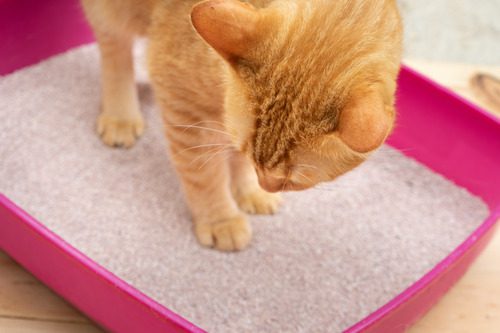Of all the habits you watch for in your cat, their litter box routine might not always be top of mind—until something seems off. If your cat hasn’t had a bowel movement in a day or two, or is straining without success, you might wonder how serious the situation really is. Constipation can be uncomfortable at best and dangerous at worst, so knowing when to act could make all the difference for your cat’s health and comfort. In this blog, we’ll break down when constipation signals an emergency, what signs to watch for, and how Fetch Specialty & Emergency Veterinary Centers can help when your cat needs urgent care.

What Is Cat Constipation?
Cat constipation refers to infrequent, difficult, or absent bowel movements. While it may seem minor at first, unresolved constipation can lead to complications, including a serious condition known as megacolon, where the colon becomes enlarged and stops functioning properly.
How Often Should a Cat Poop?
Most healthy adult cats will have a bowel movement at least once every 24 to 36 hours. Variations do occur depending on diet, age, hydration levels, and activity. If your cat hasn’t pooped in more than two days, it’s time to take a closer look.
What Causes Cat Constipation?
Several factors can contribute to constipation in cats:
- Dehydration from inadequate water intake or kidney disease
- Low-fiber diets or diets lacking moisture
- Obesity, which slows movement in the digestive tract
- Hairballs, especially in long-haired breeds
- Stress or pain that discourages litter box use
- Underlying health issues, such as spinal problems or gastrointestinal blockages
Signs That Point to a Cat Constipation Emergency
Not all constipation cases are emergencies, but certain symptoms signal that your cat needs immediate medical attention. If you notice any of the following, reach out to your nearest Fetch Specialty & Emergency Veterinary Centers location right away.
Straining in the Litter Box
Cats with constipation may posture in the litter box for extended periods, straining without success. This behavior is easy to mistake for a urinary issue, so it’s important to observe whether your cat is producing any feces.
Vomiting and Lethargy
As waste backs up in the colon, toxins can build up in your cat’s system, sometimes leading to vomiting, appetite loss, or noticeable fatigue. These are red flags that suggest a cat constipation emergency may be underway.
Painful Abdomen or Crying Out
If your cat cries out when touched on the belly or shows signs of abdominal discomfort, this may indicate a blockage or impaction. A firm, distended abdomen is also cause for concern.
Bloody Stool or No Stool at All
Small, dry, or pebble-like stool is often an early sign of constipation. If you notice streaks of blood or if your cat stops defecating altogether, that may suggest inflammation or injury in the digestive tract.
When Does Cat Constipation Become an Emergency?
While occasional mild constipation may resolve on its own, prolonged or severe constipation often needs professional treatment. So, how do you know when your cat’s constipation is an emergency?
Duration Matters
If your cat hasn’t had a bowel movement in over 48 hours, it’s time to seek veterinary guidance. Waiting longer can lead to complications that are harder—and more costly—to treat.
Accompanying Symptoms
When constipation appears alongside vomiting, weakness, hiding behavior, or signs of distress, it often signals something more serious than a dietary misstep. Cats in this state should be evaluated promptly.
Underlying Conditions
Cats with pre-existing health issues, such as chronic kidney disease or diabetes, may be more prone to dehydration and therefore constipation. These cats are at higher risk for emergencies and should not be monitored at home without professional input.
How Vets Diagnose and Manage Cat Constipation Emergencies
Once your cat is seen by a veterinarian at Fetch, a physical exam and diagnostic imaging—such as X-rays or ultrasound—may be used to identify the cause and severity of the issue. Treatment is based on the findings and your cat’s condition at the time of the visit.
Diagnostic Steps
- Abdominal palpation to feel for hard stool or distention
- Radiographs (X-rays) to evaluate the colon
- Bloodwork to check for dehydration, electrolyte imbalances, or organ dysfunction
Emergency Treatment Options
Depending on the diagnosis, your cat may receive:
- IV fluids to rehydrate and stimulate bowel movement
- Enemas, administered by veterinary professionals in a controlled setting
- Manual removal of impacted feces, if needed
- Medications to encourage motility or manage pain
In severe cases of megacolon, surgery may be recommended to remove a section of the colon. This is typically a last resort after other therapies fail.
How You Can Support Your Cat’s Digestive Health
Preventing future episodes of constipation is just as important as treating the current one. Once your cat is stable, your veterinarian will likely recommend lifestyle changes to reduce the risk of recurrence.
- Diet and Hydration: Feeding your cat a moisture-rich diet, such as canned food or prescription gastrointestinal formulas, can help maintain regular bowel movements. Fresh water should always be available, and a cat fountain may encourage better hydration.
- Litter Box Monitoring: Track your cat’s litter box habits. Knowing how often your cat defecates makes it easier to spot early changes. Clean the box daily so it’s comfortable and inviting to use.
- Weight Management and Exercise: Encouraging daily movement through interactive play can improve overall gastrointestinal motility, particularly for overweight or older cats. Maintaining a healthy weight goes a long way in preventing constipation.
- Managing Hairballs: Regular brushing and hairball management products may reduce the risk of intestinal blockages, especially in long-haired breeds or during shedding seasons.
Trust Your Instincts—And Call Fetch When It Matters
When it comes to a cat constipation emergency, early intervention can make a major difference. If you’re unsure about your cat’s behavior, it’s always better to call than to wait. Cats are experts at masking discomfort, so even mild symptoms can escalate quickly if left unchecked. At Fetch Specialty & Emergency Veterinary Centers, our emergency care team is available to assess, diagnose, and treat urgent digestive concerns, including cat constipation. If your cat hasn’t had a bowel movement in more than two days—or is showing signs of pain, vomiting, or lethargy—call us right away. Your cat’s comfort, safety, and quality of life are worth every minute.
About Us
Fetch Specialty & Emergency Veterinary Centers is a family-owned practice providing elevated specialty care, emergency medicine, and critical care in three convenient locations throughout Florida and South Carolina. Our board-certified veterinarians and highly skilled support staff all share a deep appreciation for pets, people, and the human-animal bond. We recognize how much you love your pet as a part of your family, and that’s why we love what we do!

